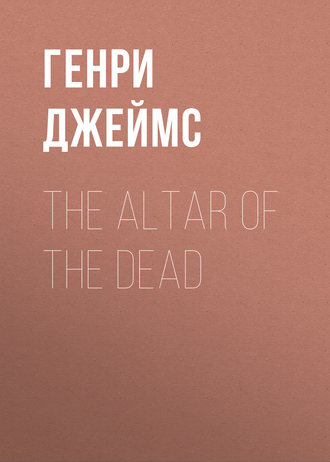
Генри Джеймс
The Altar of the Dead
CHAPTER IV
Every year, the day he walked back from the great graveyard, he went to church as he had done the day his idea was born. It was on this occasion, as it happened, after a year had passed, that he began to observe his altar to be haunted by a worshipper at least as frequent as himself. Others of the faithful, and in the rest of the church, came and went, appealing sometimes, when they disappeared, to a vague or to a particular recognition; but this unfailing presence was always to be observed when he arrived and still in possession when he departed. He was surprised, the first time, at the promptitude with which it assumed an identity for him—the identity of the lady whom two years before, on his anniversary, he had seen so intensely bowed, and of whose tragic face he had had so flitting a vision. Given the time that had passed, his recollection of her was fresh enough to make him wonder. Of himself she had of course no impression, or rather had had none at first: the time came when her manner of transacting her business suggested her having gradually guessed his call to be of the same order. She used his altar for her own purpose—he could only hope that sad and solitary as she always struck him, she used it for her own Dead. There were interruptions, infidelities, all on his part, calls to other associations and duties; but as the months went on he found her whenever he returned, and he ended by taking pleasure in the thought that he had given her almost the contentment he had given himself. They worshipped side by side so often that there were moments when he wished he might be sure, so straight did their prospect stretch away of growing old together in their rites. She was younger than he, but she looked as if her Dead were at least as numerous as his candles. She had no colour, no sound, no fault, and another of the things about which he had made up his mind was that she had no fortune. Always black-robed, she must have had a succession of sorrows. People weren’t poor, after all, whom so many losses could overtake; they were positively rich when they had had so much to give up. But the air of this devoted and indifferent woman, who always made, in any attitude, a beautiful accidental line, conveyed somehow to Stransom that she had known more kinds of trouble than one.
He had a great love of music and little time for the joy of it; but occasionally, when workaday noises were muffled by Saturday afternoons, it used to come back to him that there were glories. There were moreover friends who reminded him of this and side by side with whom he found himself sitting out concerts. On one of these winter afternoons, in St. James’s Hall, he became aware after he had seated himself that the lady he had so often seen at church was in the place next him and was evidently alone, as he also this time happened to be. She was at first too absorbed in the consideration of the programme to heed him, but when she at last glanced at him he took advantage of the movement to speak to her, greeting her with the remark that he felt as if he already knew her. She smiled as she said “Oh yes, I recognise you”; yet in spite of this admission of long acquaintance it was the first he had seen of her smile. The effect of it was suddenly to contribute more to that acquaintance than all the previous meetings had done. He hadn’t “taken in,” he said to himself, that she was so pretty. Later, that evening—it was while he rolled along in a hansom on his way to dine out—he added that he hadn’t taken in that she was so interesting. The next morning in the midst of his work he quite suddenly and irrelevantly reflected that his impression of her, beginning so far back, was like a winding river that had at last reached the sea.
His work in fact was blurred a little all that day by the sense of what had now passed between them. It wasn’t much, but it had just made the difference. They had listened together to Beethoven and Schumann; they had talked in the pauses, and at the end, when at the door, to which they moved together, he had asked her if he could help her in the matter of getting away. She had thanked him and put up her umbrella, slipping into the crowd without an allusion to their meeting yet again and leaving him to remember at leisure that not a word had been exchanged about the usual scene of that coincidence. This omission struck him now as natural and then again as perverse. She mightn’t in the least have allowed his warrant for speaking to her, and yet if she hadn’t he would have judged her an underbred woman. It was odd that when nothing had really ever brought them together he should have been able successfully to assume they were in a manner old friends—that this negative quantity was somehow more than they could express. His success, it was true, had been qualified by her quick escape, so that there grew up in him an absurd desire to put it to some better test. Save in so far as some other poor chance might help him, such a test could be only to meet her afresh at church. Left to himself he would have gone to church the very next afternoon, just for the curiosity of seeing if he should find her there. But he wasn’t left to himself, a fact he discovered quite at the last, after he had virtually made up his mind to go. The influence that kept him away really revealed to him how little to himself his Dead ever left him. He went only for them—for nothing else in the world.
The force of this revulsion kept him away ten days: he hated to connect the place with anything but his offices or to give a glimpse of the curiosity that had been on the point of moving him. It was absurd to weave a tangle about a matter so simple as a custom of devotion that might with ease have been daily or hourly; yet the tangle got itself woven. He was sorry, he was disappointed: it was as if a long happy spell had been broken and he had lost a familiar security. At the last, however, he asked himself if he was to stay away for ever from the fear of this muddle about motives. After an interval neither longer nor shorter than usual he re-entered the church with a clear conviction that he should scarcely heed the presence or the absence of the lady of the concert. This indifference didn’t prevent his at once noting that for the only time since he had first seen her she wasn’t on the spot. He had now no scruple about giving her time to arrive, but she didn’t arrive, and when he went away still missing her he was profanely and consentingly sorry. If her absence made the tangle more intricate, that was all her own doing. By the end of another year it was very intricate indeed; but by that time he didn’t in the least care, and it was only his cultivated consciousness that had given him scruples. Three times in three months he had gone to church without finding her, and he felt he hadn’t needed these occasions to show him his suspense had dropped. Yet it was, incongruously, not indifference, but a refinement of delicacy that had kept him from asking the sacristan, who would of course immediately have recognised his description of her, whether she had been seen at other hours. His delicacy had kept him from asking any question about her at any time, and it was exactly the same virtue that had left him so free to be decently civil to her at the concert.
This happy advantage now served him anew, enabling him when she finally met his eyes—it was after a fourth trial—to predetermine quite fixedly his awaiting her retreat. He joined her in the street as soon as she had moved, asking her if he might accompany her a certain distance. With her placid permission he went as far as a house in the neighbourhood at which she had business: she let him know it was not where she lived. She lived, as she said, in a mere slum, with an old aunt, a person in connexion with whom she spoke of the engrossment of humdrum duties and regular occupations. She wasn’t, the mourning niece, in her first youth, and her vanished freshness had left something behind that, for Stransom, represented the proof it had been tragically sacrificed. Whatever she gave him the assurance of she gave without references. She might have been a divorced duchess—she might have been an old maid who taught the harp.
CHAPTER V
They fell at last into the way of walking together almost every time they met, though for a long time still they never met but at church. He couldn’t ask her to come and see him, and as if she hadn’t a proper place to receive him she never invited her friend. As much as himself she knew the world of London, but from an undiscussed instinct of privacy they haunted the region not mapped on the social chart. On the return she always made him leave her at the same corner. She looked with him, as a pretext for a pause, at the depressed things in suburban shop-fronts; and there was never a word he had said to her that she hadn’t beautifully understood. For long ages he never knew her name, any more than she had ever pronounced his own; but it was not their names that mattered, it was only their perfect practice and their common need.
These things made their whole relation so impersonal that they hadn’t the rules or reasons people found in ordinary friendships. They didn’t care for the things it was supposed necessary to care for in the intercourse of the world. They ended one day—they never knew which of them expressed it first—by throwing out the idea that they didn’t care for each other. Over this idea they grew quite intimate; they rallied to it in a way that marked a fresh start in their confidence. If to feel deeply together about certain things wholly distinct from themselves didn’t constitute a safety, where was safety to be looked for? Not lightly nor often, not without occasion nor without emotion, any more than in any other reference by serious people to a mystery of their faith; but when something had happened to warm, as it were, the air for it, they came as near as they could come to calling their Dead by name. They felt it was coming very near to utter their thought at all. The word “they” expressed enough; it limited the mention, it had a dignity of its own, and if, in their talk, you had heard our friends use it, you might have taken them for a pair of pagans of old alluding decently to the domesticated gods. They never knew—at least Stransom never knew—how they had learned to be sure about each other. If it had been with each a question of what the other was there for, the certitude had come in some fine way of its own. Any faith, after all, has the instinct of propagation, and it was as natural as it was beautiful that they should have taken pleasure on the spot in the imagination of a following. If the following was for each but a following of one it had proved in the event sufficient. Her debt, however, of course was much greater than his, because while she had only given him a worshipper he had given her a splendid temple. Once she said she pitied him for the length of his list—she had counted his candles almost as often as himself—and this made him wonder what could have been the length of hers. He had wondered before at the coincidence of their losses, especially as from time to time a new candle was set up. On some occasion some accident led him to express this curiosity, and she answered as if in surprise that he hadn’t already understood. “Oh for me, you know, the more there are the better—there could never be too many. I should like hundreds and hundreds—I should like thousands; I should like a great mountain of light.”
Then of course in a flash he understood. “Your Dead are only One?”
She hung back at this as never yet. “Only One,” she answered, colouring as if now he knew her guarded secret. It really made him feel he knew less than before, so difficult was it for him to reconstitute a life in which a single experience had so belittled all others. His own life, round its central hollow, had been packed close enough. After this she appeared to have regretted her confession, though at the moment she spoke there had been pride in her very embarrassment. She declared to him that his own was the larger, the dearer possession—the portion one would have chosen if one had been able to choose; she assured him she could perfectly imagine some of the echoes with which his silences were peopled. He knew she couldn’t: one’s relation to what one had loved and hated had been a relation too distinct from the relations of others. But this didn’t affect the fact that they were growing old together in their piety. She was a feature of that piety, but even at the ripe stage of acquaintance in which they occasionally arranged to meet at a concert or to go together to an exhibition she was not a feature of anything else. The most that happened was that his worship became paramount. Friend by friend dropped away till at last there were more emblems on his altar than houses left him to enter. She was more than any other the friend who remained, but she was unknown to all the rest. Once when she had discovered, as they called it, a new star, she used the expression that the chapel at last was full.
“Oh no,” Stransom replied, “there is a great thing wanting for that! The chapel will never be full till a candle is set up before which all the others will pale. It will be the tallest candle of all.”
Her mild wonder rested on him. “What candle do you mean?”
“I mean, dear lady, my own.”
He had learned after a long time that she earned money by her pen, writing under a pseudonym she never disclosed in magazines he never saw. She knew too well what he couldn’t read and what she couldn’t write, and she taught him to cultivate indifference with a success that did much for their good relations. Her invisible industry was a convenience to him; it helped his contented thought of her, the thought that rested in the dignity of her proud obscure life, her little remunerated art and her little impenetrable home. Lost, with her decayed relative, in her dim suburban world, she came to the surface for him in distant places. She was really the priestess of his altar, and whenever he quitted England he committed it to her keeping. She proved to him afresh that women have more of the spirit of religion than men; he felt his fidelity pale and faint in comparison with hers. He often said to her that since he had so little time to live he rejoiced in her having so much; so glad was he to think she would guard the temple when he should have been called. He had a great plan for that, which of course he told her too, a bequest of money to keep it up in undiminished state. Of the administration of this fund he would appoint her superintendent, and if the spirit should move her she might kindle a taper even for him.






